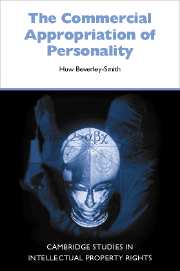Book contents
- Frontmatter
- Contents
- Preface
- Table of cases
- Table of statutes
- Part I A framework
- Part II Economic interests and the law of unfair competition
- 2 Introduction
- 3 Statutory and extra-legal remedies
- 4 Goodwill in personality: the tort of passing off in English and Australian law
- 5 Unfair competition and the doctrine of misappropriation
- Part III Dignitary interests
- Part IV Pervasive problems
- Part V Conclusions
- Bibliography
- Index
- Cambridge Studies in Intellectual Property
3 - Statutory and extra-legal remedies
Published online by Cambridge University Press: 07 July 2009
- Frontmatter
- Contents
- Preface
- Table of cases
- Table of statutes
- Part I A framework
- Part II Economic interests and the law of unfair competition
- 2 Introduction
- 3 Statutory and extra-legal remedies
- 4 Goodwill in personality: the tort of passing off in English and Australian law
- 5 Unfair competition and the doctrine of misappropriation
- Part III Dignitary interests
- Part IV Pervasive problems
- Part V Conclusions
- Bibliography
- Index
- Cambridge Studies in Intellectual Property
Summary
Anglo-Australian courts have not protected intangible elements of value under any wide generalisation, but under specific heads of protected interests. The common law tort of passing off has proved to be the most useful vehicle in protecting economic interests in personality, though to a much greater extent in Australia than in England. The protection afforded by the statutory intellectual property regimes is patchy and incomplete, and, in the case of trade marks, depends on proactive steps being taken to register a mark. In view of the costs involved, this is only worthwhile if there is a significant existing or future merchandising business. Nevertheless, some protection is better than none and the usefulness of trade mark registrations and copyright protection should not be underestimated from a practical standpoint, not least for the reason that they provide something reasonably concrete which may be licensed or assigned to third parties. In the absence of a valid action in passing off, copyright and registered trade marks, however limited in scope, might be the only licensable subject matter. Thus, the relatively limited role that statutory intellectual property rights play in protecting interests of personality is outlined, before considering the common law causes of action. The following sections focus on English law, since space precludes a detailed comparative survey.
Copyright
Copyright protection extends to the categories of works set out in the Copyright Designs and Patents Act 1988.
- Type
- Chapter
- Information
- The Commercial Appropriation of Personality , pp. 32 - 58Publisher: Cambridge University PressPrint publication year: 2002



